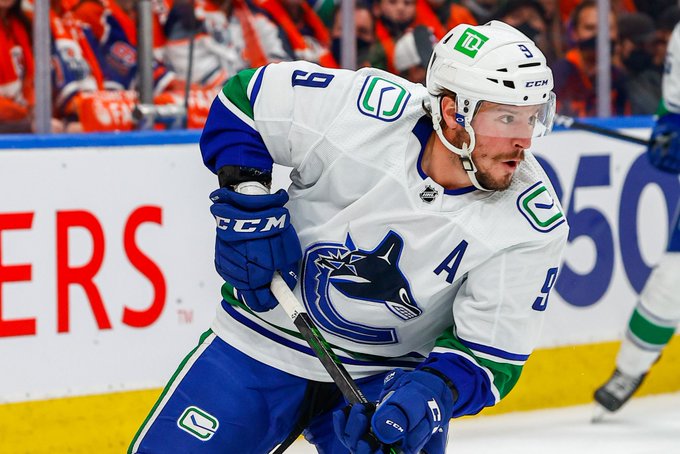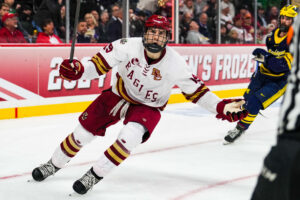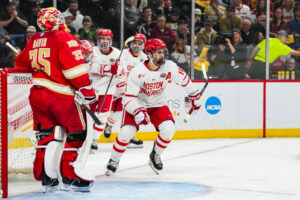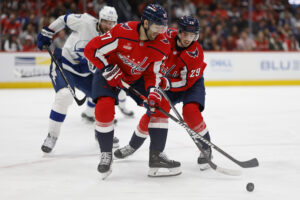Okay, optimism can only last so long among Vancouver Canucks fans, preseason or not. Even when the team’s best player returns – at a discount, no less – there has to be doom on the horizon. Anything silver linings makes West Coast fans get uncomfortable. So sit back, folks, and enjoy the bitterness in your espresso. Today we’re talking up who the Canucks backsliding players are going to be for 2022-23.
We’ve all heard “You need to lose before you learn how to win”. Yeah, no. That’s a whole lot of nonsense that people use to excuse a loss. It takes the sting out, but plenty of teams – ahem – have reached the Stanley Cup Final and then not been back for years. The reason is that hockey is a game of chaos and who can control it best and some years teams get lucky. If a team returns to the Final regularly, that means it’s a good team, not that it’s “learning how to win.”
Most Likely Canucks Backsliding Players
The parallel happens with players, too. A player will suddenly blossom and fans will ignore the sudden shooting percentage spike as their general manager signs him to an eight-year deal. If not the shooting percentage, then they click with a new linemate who is promptly traded away. Or an injury gives them more ice time, or better opportunities, or… Well, there are plenty of reasons for someone to be a One Year Wonder.
Bo Horvat
Bo Horvat is not a one-year wonder. If anything, Horvat has been incredibly (almost comically) consistent. In eight seasons of even-strength play, his points per 60 minutes has fluctuated from 1.6 to 2.1. His goals created per game* has been .28, .30. .29, .29, .32 over the past five years. That’s not much swing there. How on Earth is he, then, a nominee for being one of the Canucks backsliding players?
Embed from Getty Images
It’s going to come down to use. Horvat has typically been used as one of Vancouver’s primary penalty killers. If coach Bruce Boudreau continues fitting him into that slot, then he’s going to be used as a defensive forward. With the team talking about going three centres deep, that takes Horvat off of the top two lines. When he’s been used as a defensive forward, he can do that. When he’s expected to score, he can do that. But each one comes at the expense of the other. It’s like he’s multi-talented, but only if you take away the “multi-” part.
If Horvat’s also taken off the first unit power play – which has several more options now – he’s not going to reach last year’s career-high of 13 power-play goals. Both of those possibilities point to his offensive numbers declining this year. That and remembering he scored 14 goals in the last 20 games of the season. That’s hard to repeat.
J.T. Miller
We’ll just see ourselves out here, shall we? You know it, we know it: J.T. Miller hit career highs last year, and not by small amounts. He scored five goals and 27 points more than his previous highs, back when he was a pup of 26. Which is the none-too-subtle point many made about his seven-year, $8 million per deal. Miller was used everywhere and had 21 minutes a night in ice time because he gave the team no choice. In an ideal world, the team will start easing back his minutes as he looks for a new combination with him. In 2022-23 his best linemate was Tanner Pearson and that’s just not likely to happen this year.
None of this means Miller is going to have a bad year – heck, even if he drops 20 points from last year to this, that’s a point-per-game pace. But when a long-time veteran has such a massive spike in scoring, he becomes a classic option for regression to the mean.
Spencer Martin
The Canucks presumptive backup in 2021-22 really came out of nowhere to win his spot. Spencer Martin started six games for Vancouver – his first NHL games since three as a rookie in 2017-18. He had zero wins back then and didn’t get his first until game three with Vancouver. But the league being what it is, he got the team points every time he played last season. Three wins, two shootout losses, and an overtime loss is a GREAT way to get loved by the fans.
But the fans have to remember that he’s only played nine career NHL games. He finished the season with a .950 save percentage, and that’s a fine example of the hazards of using small sample sizes. Martin isn’t going to play just six games this season because Thatcher Demko needs to rest. How will he react to suddenly playing 30 NHL games as a 27-year-old? Hint: he’s featured in an article called “Vancouver Canucks Backsliding Players” so…
The Exception
If you’re a Canucks fan, then you know the personal trials that Brock Boeser has been going through. The death of a parent – or anyone close to you – is difficult, especially when you’re young. You never know what form mourning is going to take or how the loss is going to affect you. After a long illness, there can be a clash of emotions – including relief, and guilt over feeling it. The world we’re in doesn’t allow a lot of time to process those losses. If we’re here, we’re working.
The loss of Boeser’s father Duke is obviously going to have repercussions for Brock. What form that’s going to take, we don’t know – and, frankly, neither does anyone else. Statistically, his record has been all over the place, with shooting percentages from below 10% to over 16%. His points-per-game has been anywhere from 2.1 to 3.0. Will that increase? Will it decrease? What we can be sure of is that Boeser’s a vital part of the Canucks success and is going to be used accordingly. But if he needs some days off somewhere during the season, well, that can happen, too.
*hat tip to Hockey-Reference.com
J.T. Miller appreciation post. pic.twitter.com/yRFXpDytax
— Vancouver #Canucks (@Canucks) April 30, 2022






